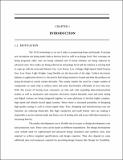| dc.contributor.advisor | Mandal, Sushanta | |
| dc.contributor.advisor | Nagchoudhuri, Dipankar | |
| dc.contributor.author | Jain, Mahavir Rajmal | |
| dc.date.accessioned | 2017-06-10T14:37:57Z | |
| dc.date.available | 2017-06-10T14:37:57Z | |
| dc.date.issued | 2009 | |
| dc.identifier.citation | Jain, Mahavir Rajmal (2009). Built-in self test architecture for mixed signal systems. Dhirubhai Ambani Institute of Information and Communication Technology, xii, 50 p. (Acc.No: T00219) | |
| dc.identifier.uri | http://drsr.daiict.ac.in/handle/123456789/256 | |
| dc.description.abstract | Built-in self test architecture or BIST as we call them, are the necessity of time since the shrinking sizes of component on-chip with advance in IC technology are making it BIST artistries are being rapidly developed and used for digital circuitry due to well defied fault models and advanced designs tools and techniques available. But with more analog circuitry being built on same platform with digital circuitry, the necessity for BIST architecture of mixed signal system on chip is increasing.
The proposed BIST scheme is developed to test the data converters, both DAC and ADC on chip as well as other analog IP modules depending on specification of design without/least affecting the architecture of actual design and without making use of any complex DSP circuitry. The concept of internet node access based testing of digital blocks is also used for dynamic parameter of DAC like offset voltage and gain error, monotonicity and linearity non-specific BIST scheme. Letter the digital control logic protion of SAR ADC is tested with scan-chain insertion and thus overall functionality of SRA ADC is verified. A simple comparison based method is also proposed for other type ADCs.
For other anlog IPs, we propose IP-based testing where digital to analog converted test signals can be applied depending on specifications of IP design from vendor without affecting architecture of the design. The output from IPs are taken at different nodes and applied directly to ADC on chip. The digitized output response is then compared with expected response to test the functionality of the DUT and find out its deviation from desired value to achieve pre-defined level of accuracy. The design failing any of the sequence of afore-mentioned test is discarded faulty. The circuitry is designed and evaluated at schematic level using TSMC complementary metal oxide-semiconductor (CMOS) 0.5um technology. | |
| dc.publisher | Dhirubhai Ambani Institute of Information and Communication Technology | |
| dc.subject | Automatic test equipment | |
| dc.subject | Integrated circuits | |
| dc.subject | Verification | |
| dc.subject | Integrated circuits | |
| dc.subject | Design and construction | |
| dc.subject | Signal processing | |
| dc.subject | Digital techniques | |
| dc.subject | Mixed signal circuits | |
| dc.subject | Testing | |
| dc.subject | Mixed signal circuits | |
| dc.subject | Design and construction | |
| dc.subject | Metal oxide semiconductors | |
| dc.subject | Design and construction | |
| dc.subject | Integrated circuits | |
| dc.subject | Very large scale integration | |
| dc.subject | lectronic circuit design | |
| dc.subject | Signal generators | |
| dc.subject | Design and construction | |
| dc.classification.ddc | 621.381548 JAI | |
| dc.title | Built-in self test architecture for mixed signal systems | |
| dc.type | Dissertation | |
| dc.degree | M. Tech | |
| dc.student.id | 200711031 | |
| dc.accession.number | T00219 | |

